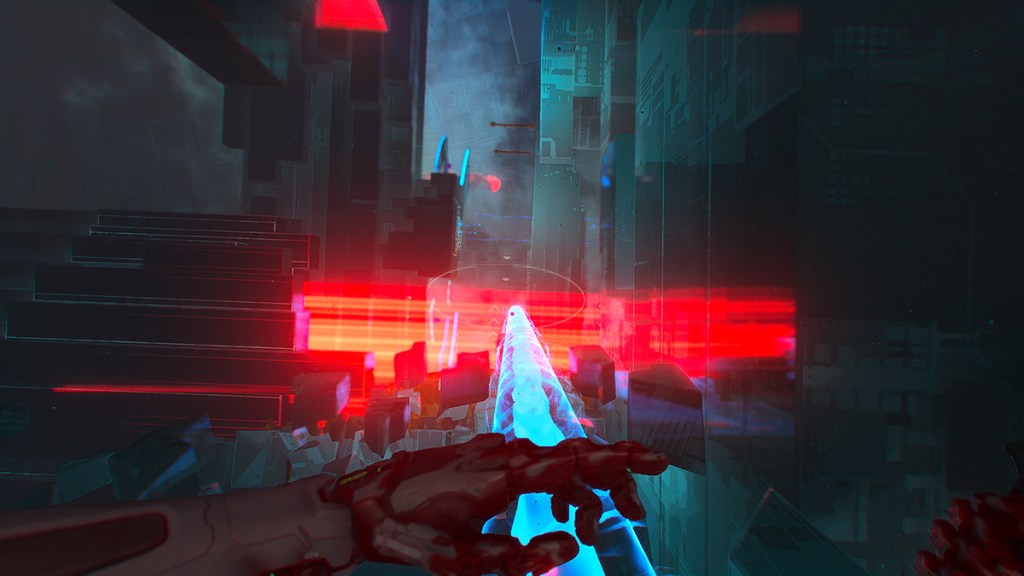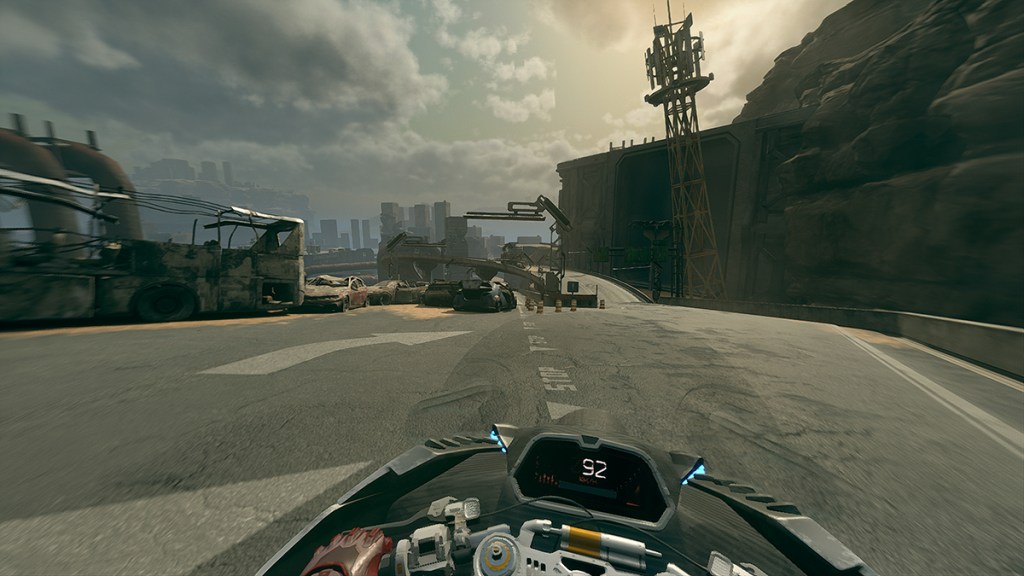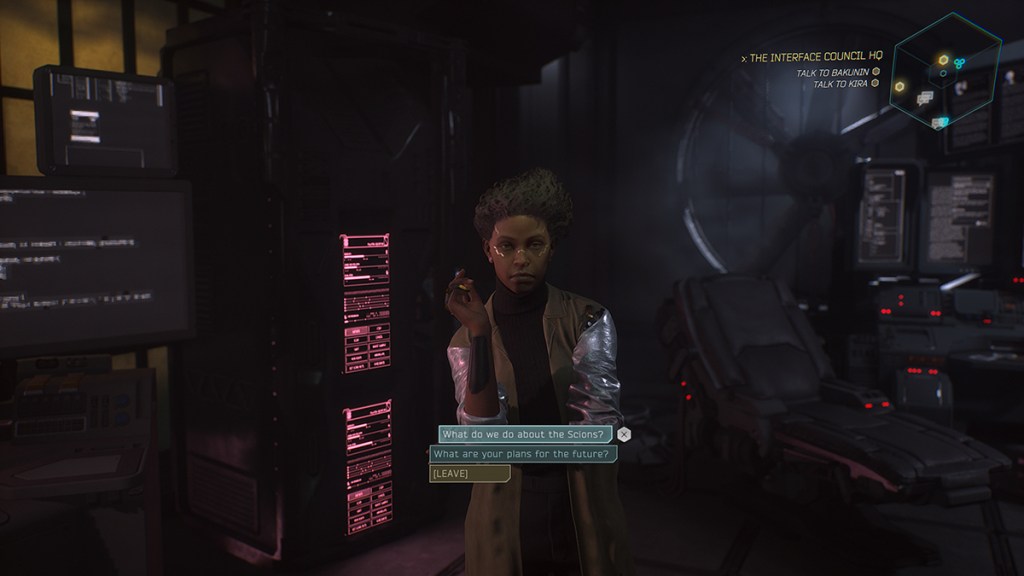Ghostrunner captured the fantasy of being a cyborg ninja better than any other game before it. Its trial-and-error nature could be taxing, but it trained players to perform its many acrobatics in one smooth motion like a “real” cyborg ninja. Momentum defined that cyberpunk parkour game. However, that momentum hasn’t fully transferred to its sequel, Ghostrunner 2. Instead of fully darting forward, it opts to slow down both literally and metaphorically, which keeps this follow-up from reaching a new top speed.
Ghostrunner 2 is able to keep some sort of pace with its predecessor by having many of the same moves. Outside of a few rare and understandable quirks, its smooth controls ensure that it’s always possible to slow-mo dodge, wall run, dash, slash, slide, and grapple around its elaborate urban jungle gyms. Chaining these together perfectly to get through a tough section by mere inches is a rush that often only comes after failing a few times. Generous checkpoints, instant restarts, and the tight controls mean that it is never frustrating and, as was previously stated, allows players to feel more like an adept cyborg ninja.
This also applies to the arenas with enemies that are more akin to puzzle challenges than combat ones. Figuring out how to most efficiently slash everything to ribbons without taking a single bullet is tricky but often open enough to allow for some player expression. Whereas platforming usually depends on nailing one route, these more violent sections are less linear and thus more liberating. Both halves require skill and reflexes to conquer but intelligently contextualize that thesis in their own ways. It’s one cohesive experience brought together by its fast-paced electronic soundtrack that often perfectly fits the action and cyberpunk aesthetic.

However, not many of these sections are as challenging as they were in the first game or its incredible expansion, Project Hel. Ghostrunner 2 is not an outright easy game, and most of its sections only require a handful of retries to get through. It lacks the tough gauntlets a sequel like this should have, ones that push skilled players and fully stress what its fluid controls can handle. Some of this challenge is relegated to its fantastic roguelike challenge mode, but the base game deserves more complicated sections that force players to improve.
Some of its relatively easiness stems from how many tools and scenarios it borrows from the first game; wall running across billboards and grappling to a platform isn’t tricky after spending a full game repeatedly doing that. The motorcycle and wingsuit seem like they are the tools to do just that, but aren’t properly utilized.

This isn’t clear during the first section with the motorcycle since it’s a stunning set piece that has players speeding through a narrow hazard-filled tube and then down the side of the massive tower where both games take place. Narrowly avoiding lasers, ejecting from and then grappling back to the bike, and blasting obstructions make it an adrenaline-pumping exercise that takes the core values of the parkour and gloriously applies them to a completely different setting.
But instead of only using the bike for explosive scenes like this, it mostly devolves into a means of traversing a boring wasteland. Its utility as a faster parkour machine is tossed aside in favor of being a normal bike. The wingsuit is similarly stunted. It’s the centerpiece in a handful of segments that add a whole new dimension to the platforming and show what’s possible, but Ghostrunner 2 simply doesn’t have enough sections like this. It’s also only introduced in the final hour or two, meaning it barely has any time to stretch its wings.

Both shortcomings also feed into how much Ghostrunner 2 slows itself down to a crawl. A lot of its more intense sections are padded out with out-of-place puzzles or sequences that don’t have much else going on. The action is constantly interrupted with cutscenes and brief trips back to base where players are expected to talk to the two-dimensional side characters about the superfluous story.
Ghostrunner does movement better than most games, so it’s puzzling why it insists on branching out into areas it doesn’t specialize in. It doesn’t need an open wasteland full of mindless traversal, repeated treks back to headquarters, lengthy dialogue exchanges, or puzzles. Going into new territory is not a bad idea in theory, but it is questionable when those fresh ideas directly oppose the series’ core tenets. The fast platforming and action are excellent in Ghostrunner and almost everything that doesn’t support that actively impedes it.
Ghostrunner 2 Review: Final Verdict
Ghostrunner 2 goes against its programming by repeatedly slowing down, but it’s still made up of enough of its classic parts. Sprinting and dashing around the neon-lit city while cutting down its many cybernetic forces can be an empowering trip that’s only bolstered by its thumping electronic soundtrack. A strong core like this deserves to be expanded upon more robustly through its new and existing mechanics, which just isn’t the case here. Ghostrunner 2 has taken a few steps forward and a few steps back, but even though it is running in place, it’s still faster than most of its competition.
-
Fast-paced parkour is still a thrilling trial-and-error exercise that rewards execution
-
New additions like the motorcycle and wingsuit further expand the core set of tools
-
Electronic music thumps and matches the tempo of the action
-
Far too many story sequences slow down the flow
-
The motorcycle and wingsuit are underutilized
-
Too many sections are about puzzle solving or filler traversal and not fast parkour, especially the misguided parts outside of the tower
Disclaimer: This Ghostrunner 2 review is based on a PS5 copy provided by the publisher. Played on version 1.000.001.













